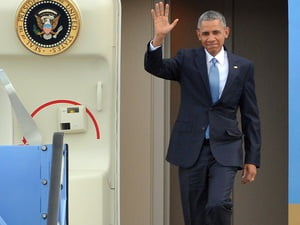

US President Barack Obama has blazed new trails in US foreign policy – with a nulcear deal with Iran and rapprochement with Cuba – but he boards Air Force One this week bound for some of Washington’s oldest allies to tackle rising threats from terrorism to isolationism.
Obama, whose term ends in January, leaves Tuesday on a six-day trip starting with a stop in Saudi Arabia, where he will meet with King Salman and attend a Gulf Cooperation Council meeting.
From there, the president will fly to Britain for talks with Prime Minister David Cameron and a visit with Queen Elizabeth, before continuing to Germany for a meeting with Chancellor Angela Merkel and an appearance at the Hanover trade fair.
Among the big topics during all three stops will be the threat of Islamic State in Iraq and Syria, as well as Europe in the wake of the Paris and Brussels attacks.
The GCC summit on Thursday follows a meeting of the regional group’s leaders last year at the US presidential retreat, Camp David, where Obama sought to reassure the Gulf countries as the Iran nuclear deal was being negotiated.
The meeting will include discussions on Islamic State and Iran. The White House touts progress on regional stability since the leaders last met, but the gains are fragile – a ceasefire and peace process in Yemen, a cessation of hostilities in Syria and a government of national accord in Libya.
Behind the scenes, Obama will likely have to smooth relations following his recent criticism of Saudi Arabia. In an interview with The Atlantic magazine, he suggested Riyadh needs to share the region with Iran and implied Saudi Arabia as well as some European nations were “free riders” on the international stage.
After travelling from Riyadh to London, Obama will have to walk a public tightrope on Britain’s upcoming vote on whether to exit the European Union. The referendum alongside global issues including Islamic State, counterterrorism, Afghanistan, Ukraine and the sluggish global economy will be on the agenda during a meeting Friday with Cameron.
The White House says Britain has a strong role to play in a united Europe, while underscoring that the so-called “Brexit” vote is a matter for the British people to decide.
“We believe that all of us benefit when the EU can speak with a strong and single voice, and can work with us to advance our shared interests, whether on security or prosperity,” Deputy National Security Advisor Ben Rhodes said.
“We would not want to see a Brexit that could potentially damage the European Union and increase the challenges it faces.”
Obama is to lunch with Queen Elizabeth, who this week marks her 90th birthday, and have dinner with Prince William and his wife, Kate.
Wrapping up the trip in Germany beginning Sunday, Obama will join Merkel at the world’s largest industrial trade fair in the central city of Hanover.
The venue will provide the leaders a chance to breathe fresh life into the Transatlantic Trade and Investment Partnership (TTIP) talks, which would create the world’s largest free trade area with 800 million people.
The prospective trade agreement being hashed out between the United States and Europe has taken a backseat to a US-led trade deal with the Pacific Rim, and faces little chance of advancement during a US election year that has seen most leading candidates take decidedly anti-trade postures.
“Time is not on anyone’s side at the moment,” said Heather Conley of the Centre for Strategic and International Studies in Washington, who points to significant “unknowns” in the backdrop of the trade deal, not only in the US but with elections next year in Germany and France.
Obama and Merkel will face discussions about increased intelligence and counter-terrorism cooperation within Europe after terrorist attacks in recent months, and the challenges posed by the ongoing refugee crisis.
The White House praised Merkel’s “enormous courage and vision” on refugees, but the US has largely left the Europeans to sort out the crisis themselves. The US has instead underscored the need to solve the underlying political issues in Syria and focused on helping refugees while they are still in the Middle East.
[SOURCE:- DPA]



